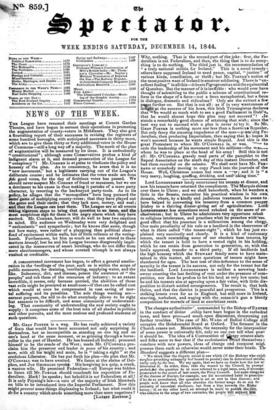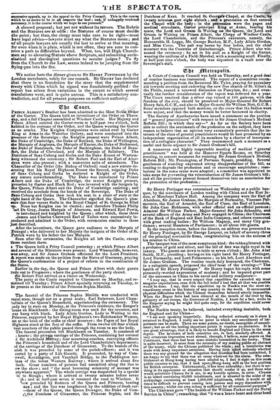The changes authoritativr', commanded by the Bishop of EXETER in
the conduct of divine Jr ship have been begun in the cathedral town, and have prove.ed much open discontent, threatening yet further troubles. The case of Mr. WARD of Balliol College still occupies the Hebdomadal Board at Oxford.. The ferment in the Church ceases not. Meanwhile, the necessity for the interpositior of some power is universally felt, only no one can tell what powr it should be. The idea of a Convocation of gkrgy creates slain and folks seem to fear that if the ecclesiasticsnd themselves conclave with new powers, ideas of change and 'conquest migt, possess them such as otherwise would never enter their heads. Tin Standard suggests a different plan- ,. We think that the dispute raised is one which (if the Bishops who enjoin surplice-preaching unhappily feel bound to persist) can be determined satisfac torily only by the law. We say again' that we have no doubt how the law wi. determine it. In order, then, that the wound to the Church be prompt probed,Jet the question be at once referred to a legal issue, and,if necessar: prosecuted to the court of last resort, the Privy Council. Let some clergy:is of the diocese of Exeter,.for example, use his accustomed habit in preachify if he do so unmolested, the question is set at rest in that diocese; and people well know that all who abandon the former usage do so not frc necessity of canonical obedience, but from a bias, towards the Roma heresy : if, on the other hand, an attempt be made to punish the alert who adheres to the usage of two centuries, the people *).11 support bioi successive appeals, up to the appeal to the Privy Council. This is the course which to us seems to be in all respects the best ; and, if unhappily rendered necessary, it is the course which we hope to see pursued."
A shrewd proposal; but yet not without its terrors. The Rubric and the Statutes are at odds : the Statutes of course must decide the point ; but then, the clergy must take care to be right—must Lave legal advice—lawyers must say what the Statutes mean ; and of all people lawyers are usually the last to arrive at that meaning, for even when it is plain, which is not often, they are sure to con- trive a path to difficulties beyond. What, too, will High Church- sten say to elevating Statute above Scripture, and submitting eccle- siastical and theological questions to secular judges ? To fly from the Church to the Law, seems indeed to be jumping from the frying-pan into the fire.



























